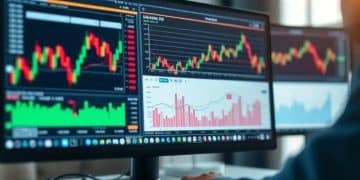Timely updates on worldwide economic news for savvy readers

Timely updates on worldwide economic news are crucial for understanding market trends, making informed decisions, and navigating financial challenges effectively.
Timely updates on worldwide economic news are essential for anyone wanting to navigate today’s fast-paced financial landscape. Curious about what’s impacting your wallet? Let’s dive into it!
Key global economic indicators to watch
Understanding key global economic indicators is essential to grasp how economies function and how they impact our daily lives. These indicators provide critical insights, helping both businesses and individuals make informed decisions.
Important Economic Indicators
Several indicators are particularly important to keep an eye on:
- GDP Growth Rate: This measures how fast an economy is growing. A higher growth rate often means a healthy economy.
- Unemployment Rate: This indicates the percentage of the labor force that is unemployed and actively seeking work. A lower unemployment rate is usually a sign of better economic conditions.
- Inflation Rate: This shows how much prices for goods and services are increasing. High inflation can erode purchasing power.
- Consumer Confidence Index: This gauges how optimistic consumers feel about the economy, influencing their spending habits.
Monitoring these indicators can help you understand underlying trends. For instance, if the GDP is growing, it often leads to more jobs and higher wages. In contrast, high unemployment may indicate economic issues ahead.
Additionally, global events can influence these indicators. For example, a crisis in one country can trigger a domino effect worldwide. This is why staying updated is crucial.
The Importance of Timely Updates
With these indicators, having timely updates is invaluable. They allow businesses to adjust their strategies and individuals to plan their finances better. Regularly following economic news through reliable sources keeps you informed about fluctuations and their implications.
Understanding these metrics not only helps in making quick decisions but also prepares individuals and businesses for the future. A proactive approach can significantly mitigate risks associated with economic downturns.
Impact of geopolitical events on the economy

The impact of geopolitical events on the economy can be significant and far-reaching. These events often shape financial markets and influence global trade dynamics.
Key Geopolitical Events to Monitor
Several types of geopolitical events can directly affect economic conditions:
- Conflicts and Wars: Armed conflicts can disrupt trade routes, cause scarcity of resources, and lead to instability in affected regions.
- Trade Agreements and Tariffs: Changes in trade policies can significantly alter market access for countries, impacting prices and supply chains.
- Policy Changes: New government policies, especially in major economies, can shift investment trends and affect global markets.
- Natural Disasters: While often overlooked, events such as earthquakes or hurricanes can disrupt economies by damaging infrastructure and displacing populations.
For example, a major conflict can lead to spikes in oil prices, directly affecting transportation and manufacturing costs worldwide. Understanding these events provides context for why markets may react a certain way during turbulent times.
Additionally, shifts in diplomatic relations can lead to new economic alliances or sanctions. Watching these developments helps you stay prepared for potential economic shifts.
The Importance of Staying Informed
With the constant changes in our world, having access to timely updates on geopolitical events is crucial. It allows businesses to adapt their strategies and individuals to make informed financial decisions.
Awareness of political tensions or negotiations can help anticipate market movements. By understanding the interplay between politics and economics, you can better navigate your financial landscape.
How inflation trends affect everyday life
Inflation trends have a profound impact on everyday life, influencing everything from the cost of groceries to housing prices. Understanding how these trends operate can help individuals make better financial decisions.
Key Effects of Inflation
Inflation leads to rising prices, and its effects are felt in various ways:
- Higher Costs of Living: As prices increase, the money you earn buys less. This can strain household budgets.
- Increased Interest Rates: To combat inflation, central banks may raise interest rates, making loans and mortgages more expensive.
- Wage Growth Lag: Often, wages do not keep pace with inflation, leading to reduced purchasing power for workers.
- Impact on Savings: When inflation is high, the value of money saved decreases over time, affecting long-term financial goals.
For example, if the inflation rate is 3% and your salary only increases by 2%, you are effectively losing purchasing power. Grocery bills can rise significantly, leading families to cut back on non-essential items.
Additionally, housing prices tend to rise during inflationary periods as construction costs increase. This can make home ownership more challenging for many. Being aware of inflation trends allows individuals to budget more effectively.
Strategies to Mitigate Inflation’s Effects
There are steps individuals can take to alleviate the pressures of rising inflation. First, consider adjusting spending habits to prioritize needs over wants. Creating a budget that accounts for rising prices can also be beneficial. Look for sales and discounts when shopping, and consider bulk purchasing for non-perishable items.
Investing in assets that tend to appreciate in value, such as real estate or stocks, can also provide a hedge against inflation. This is crucial for maintaining your wealth over time. Staying informed about economic trends will enhance your ability to respond to changes in the market.
Resources for staying updated on economic news

Staying updated on economic news is crucial for making informed decisions. Various resources are available that can help keep you in the loop about global economic happenings.
Essential Resources
Here are some valuable resources to consider:
- News Websites: Reputable sites like Bloomberg, Reuters, and The Wall Street Journal provide up-to-date articles and analysis.
- Financial Apps: Applications like CNBC and Yahoo Finance offer real-time data and alerts on market trends and news events.
- Podcasts: Financial podcasts often feature expert discussions and insights, making complex topics digestible.
- Social Media Platforms: Following economic analysts and news organizations on platforms like Twitter can provide instant updates.
Using a mix of these resources can enhance your understanding of economic developments. For instance, news websites often provide in-depth articles, while podcasts can offer a more conversational approach.
Joining online forums or communities can also be insightful. These platforms allow members to share information and discuss current trends, enhancing your knowledge through collaboration.
Staying Proactive
In the fast-paced environment of economics, being proactive is key. Setting up alerts or subscribing to newsletters from reliable sources ensures that you won’t miss important updates. Many websites offer customizable alerts based on your interests.
Engaging with webinars and online courses can also deepen your understanding of economic principles and current events. This continuous learning approach equips you to better analyze news and make strategic decisions.
FAQ – Frequently Asked Questions about Economic News
Why is it important to stay updated on economic news?
Staying updated helps you make informed financial decisions and understand market trends that can affect your personal and professional life.
What are the main indicators to watch in the economy?
Key indicators include GDP growth, unemployment rates, inflation rates, and consumer confidence, which provide insights into economic health.
How do geopolitical events influence the economy?
Geopolitical events can disrupt trade, create uncertainty, and impact markets, leading to fluctuations in prices and investment strategies.
What resources can help me stay informed about economic changes?
You can use news websites, financial apps, podcasts, and social media to keep track of economic updates and trends.





